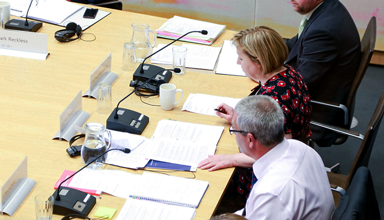Diversity and inclusion are at the core of representative democracy. Parliaments have a duty to make decisions informed by experiences, needs, and views that reflect the diversity of the people and communities they serve. Scrutiny, representation and decision-making are stronger and more effective if they are rooted in a variety of different perspectives and lived experiences.
The role of the Senedd is to scrutinise government actions and spending, and to make effective laws that work for everyone. Senedd committees do this by engaging with the people of Wales and gathering evidence in a number of ways, including in written form, in oral hearings, and through direct citizen engagement. It is critical that committees hear a diverse range of perspectives and experiences.
Diverse expertise and views also help to create a more dynamic conversation and provide more rigorous challenge and testing of proposals. We want the people of Wales to feel that their voice is heard and valued by the Senedd, whoever they are, wherever they live, whatever their perspective.
What do we mean by diversity?
Diversity comes in many forms. We want to make sure that the evidence used by Senedd committees comes from a diverse and inclusive range of people, communities, sectors, groups and organisations - especially those that are affected by an issue under consideration.
Diversity monitoring
Update: On 3 July 2023, Chairs’ Forum considered the results of the second pilot, and agreed to roll out routine collection of this data from September 2023.
Following a series of pilots, from September 2023 Senedd committees will routinely monitor the diversity of the evidence they receive.
This monitoring will focus on 'discretionary' contributors (i.e. contributors who are individuals, professionals or organisations representing sectors other than the Welsh Government), and a focus on committees which have broad discretion over their work programmes and ways of working.
People submitting written evidence, contributing oral evidence, or participating in citizen engagement activities will be invited to tell us about themselves and the organisations they represent. This will help us to better understand who gives evidence, who doesn’t, and what the barriers to participation might be. It will allow us to find ways of overcoming obstacles and design new methods of gathering views and expertise, in a parliament that works for everyone.
Ahead of deciding to move to continuous monitoring, the Chairs’ Forum considered the results of the second pilot (run from October 2022 to May 2023) and a report on this data will be published in due course.
Protecting your data
Diversity monitoring data will be anonymised, and provision of it is entirely voluntary. You can read more about how we will protect your data in our privacy notice.
What we are doing to diversify evidence
The Senedd’s engagement teams work with communities and citizens to encourage wider participation in committee work. Senedd Research’s knowledge exchange programme also aims to diversify the research evidence available to Members and committees.
Read our frequently asked questions about diversity monitoring to find out more.
Frequently asked questions (FAQs)
This section provides answers to questions that are frequently asked regarding diversity monitoring work by Senedd committees.
Diversity monitoring is the practice of collecting information about who people are and what characteristics they may have. These characteristics can include: age; sex; disability; race; and sexual orientation and are formally known as ‘protected characteristics’.
Senedd committees monitor diversity by inviting people who work with us (whether by submitting written evidence, contributing oral evidence, or participating in citizen engagement activities) to tell us a bit more about themselves and the organisations they represent. The responses received help Senedd committees to better understand who gives evidence, who doesn’t, and what the barriers to participation might be.
Diversity monitoring is also sometimes known as ‘equality monitoring’ or ‘equal opportunities monitoring’.
Monitoring diversity is helpful in a number of ways. It enables Senedd committees to better understand who is giving evidence and engaging with their work. The role of the Senedd is to scrutinise government actions and spending, and to make effective laws that work for everyone. Hearing from a diverse range of perspectives and experiences will help committees to undertake more rigorous scrutiny and make better laws.
For more information on why Senedd committees value diversity, please read the Senedd committees diversity statement.
We are asking people to complete a voluntary survey to provide information about themselves, the organisation they represent (if relevant) and their experience of taking part in committee activity. You do not have to complete the survey. All questions about you as an individual will include an option of ‘prefer not to say’. You will not be asked to provide any accompanying identifying information such as your name or contact details.
We will also analyse information that we already hold about people and organisations who give evidence at committee meetings. You can find information about how we will do this in the Senedd committee privacy notice.
Where possible, yes. While responding to the survey is entirely voluntary, the more responses we receive the better and more robust the data will be. We appreciate that your time is precious, but by responding every time you give evidence, you will help us to build a full picture of who Senedd committees are working with. This will help us to make better, evidence-based decisions further down the line.
The survey should take no more than five minutes to complete.
The results will feed into regular monitoring reports, which we anticipate will be published on the Senedd website. Where information has been gathered through diversity monitoring surveys we will take all reasonable steps to make sure that individuals cannot be identified in the information that we publish. While it may be possible in certain cases to identify individuals from their responses, we will only publish statistical information in datasets large enough so as not to enable individuals to be identified.
For more information about data protection, please read the diversity monitoring privacy notice.
The statistical findings and analysis will be shared with Senedd Commission officials and elected Members. This may include the Llywydd, the Senedd Commission, the Chairs’ Forum and Senedd committees. The findings will be used by officials and elected Members to identify trends in participation and engagement with the work of Senedd committees.
The results will feed into regular monitoring reports, which we anticipate will be published on the Senedd website.
For more information about data protection, please read the diversity monitoring privacy notice.
There are a number of external organisations that can provide advice and support for individuals in relation to the issues covered in the monitoring survey. This is not an exhaustive list.







